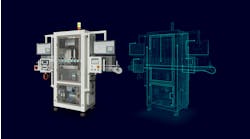More than a decade ago, tech investor Marc Andreessen famously insisted that software was eating the world. While manufacturing will always require some form of hardware to physically produce goods, more of the process design and management relies on digitalized platforms.
Even at Methods Machine Tools’ open-house event in Gilberts, Illinois, where machinery was the focus, numerous partner companies exhibited their wares and spoke at informative seminars. Two software providers explained which courses on the manufacturing menu they’d consumed.
Hexagon/Esprit
Hexagon is manufacturing-centric AI software and hardware provider for discrete manufacturers. Keith Jablonowski, regional sales manager at Esprit, a Hexagon Manufacturing Intelligence company, spoke at Methods Machine Fest.
Hexagon has an offering for everything from quoting, planning, preparation and machine programming, which is the Esprit software part, to process certification, manufacturing, on-machine measurement, quality inspection and data analytics.
Hexagon’s Designer is a computer-aided design (CAD) software. “You can start from scratch; it’s more of a design-for-manufacturing software,” explained Jablonowski. Esprit is a computer-aided manufacturing (CAM) system for CNC programming, optimization and simulation, supporting the manufacturing process. “The after-Esprit piece is NCSimul, an all-in-one CNC simulation software that manages the complete machining process from the NC program to the machined part,” he said. “With the digital twin, we want to recreate the customer’s machine.”
Hexagon also offers metrology and inspection from coordinate measuring machines (CMMs), portable measuring arms and laser trackers to structured light scanners and probing systems.
“Esprit is for the higher-end shops doing four- or five-axis machining,” explained Jablonowski. “If you’re doing multiple disciplines and want one package, Esprit is the one. As part complexity, changeover, machine complexity, revisions and number of different machine platforms increase, you’re more likely to use Esprit.”
The AI has been available two years, and the fixturing came out a few months ago. The goal is edit-free accurate NC code. “We don’t want our customers editing a single line of code,” said Jablonoswki. “You can bring data from just about anywhere into Esprit. Native CAD data readers are good for accurate import.”
Esprit is a full-spectrum software, explained Jablonoswki, from your two-axis to five-axis milling. It’s designed for continuous stock awareness through milling and turning processes and across setups. “Esprit handles all of the secondary operations—pickup, release, bar feed, bar pull, tailstock, steady rest, probing,” he said. “It’ll do traditional cutting where it can, but you can take advantage of the cutting positions. You don’t have to worry about tooling and spray when you’re looking at it in Esprit.”
An Esprit CAM Post Processor Manual is available to explain how to use the software for a variety of machines, including the Fanuc Robodrill series or Nakamura-Tome NTJX Series, both on display at Methods Machine Fest.
Esprit can also optimize from one head/spindle to another. “If the cycle times are very different, then it will tell you to move a process to the other turret, for example,” said Jablonowski. “To move to a new machine—from a Fanuc Robodrill to a Yasda five-axis—I can move to the new machine in the software and decide what changes I want to make. You can, for example, change the block stock geometry.” A fixed library of about 1,000 machines is already available in the Esprit software, he explained.
Fastems
Why do we need automation? “Automation allows companies to buy the right number of CNCs that they need,” explained Chris Rezny, regional sales manager, Fastems, who also presented during Methods Machine Fest. “The goal for Fastems is to get an end user at least 70% utilization.”
Fastems supplies CNC automation to help solve the fundamental challenges and inefficiencies around variable-batch, high-mix production. Its goal is to aid manufacturers in making the most of the 8,760 hours available in a 365-day calendar year, said Rezny.
Fastems’ offering includes manufacturing management software (MMS), which controls its flexible manufacturing system (FMS), encompassing FMS One, RoboFMS and multi-level system (MLS). More than 1,650 flexible manufacturing systems have been delivered, covering more than 90 machine-tool brands via open integration, said Rezny.
Fastems is designed to enable sharing jobs across machines. “Get rid of labor problems, and hire various talents, instead of expecting every CNC operator to master it all,” explained Rezny. “Scale your operations up and down quickly to remain profitable, so you can be resilient when the market fluctuates and adapt production to sudden events, such as machine breakdowns or an urgent customer order in real time.”
Fastems’ software communicates with the CAM system and the programming, building a “house of intelligent automation.” The family-owned company has more than 550 employees and 40 years of automation experience. Industries include production technology, aerospace and subcontractors, or job shops. “For example, Fastems helps metalworking manufacturers in improving their productivity and profitability by providing intelligent automation, software and services,” said Rezny.





